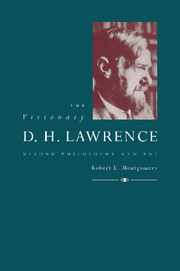Book contents
- Frontmatter
- Contents
- Acknowledgments
- 1 Introduction
- 2 Flesh, Word, and Holy Ghost: Lawrence and Schopenhauer
- 3 The passionate struggle into conscious being: Lawrence and Nietzsche
- 4 “A dry soul is best”: Lawrence and Heraclitus
- 5 The science of the soul: Lawrence and Boehme
- 6 Conclusion: Romanticism and Christianity
- Bibliography
- Index
3 - The passionate struggle into conscious being: Lawrence and Nietzsche
Published online by Cambridge University Press: 08 January 2010
- Frontmatter
- Contents
- Acknowledgments
- 1 Introduction
- 2 Flesh, Word, and Holy Ghost: Lawrence and Schopenhauer
- 3 The passionate struggle into conscious being: Lawrence and Nietzsche
- 4 “A dry soul is best”: Lawrence and Heraclitus
- 5 The science of the soul: Lawrence and Boehme
- 6 Conclusion: Romanticism and Christianity
- Bibliography
- Index
Summary
DIONYSUS AND DARWIN
This chapter focuses on Women in Love and the Study of Thomas Hardy. The thesis of the chapter can be simply stated by saying that Nietzsche is to Women in Love and the Hardy study as Schopenhauer is to The White Peacock and the “Foreword.” There is an important relation between Nietzsche and Lawrence, but, as in the case of Schopenhauer, the question of influence is a vexed one. The correspondences between Nietzsche and Lawrence are so striking and so extensive that several critics assume a massive, direct, and sustained influence. Harry Steinhauer concludes that Lawrence “takes over the Nietzschean ‘system’ in its entirety” (225), Kingsley Widmer describes Lawrence as “an English Nietzsche” (121), and Daniel J. Schneider asserts that ‘Lawrence's thought corresponds so closely on so many counts to Nietzsche's that it is obvious the German philosopher was one of Lawrence's greatest passions” (Consciousness 57). Yet, strangely, it is impossible to tell which of Nietzche's works Lawrence actually read, or if indeed he read any. He rarely refers to Nietzsche by name and almost never mentions specific works. His references are usually to concepts, like the will to power or eternal recurrence, which appear in many places in Nietzsche and which could in fact be easily picked up without reading him at all. Sometimes Lawrence's comments on Nietzsche are so inaccurate and perverse that one wonders if he knew anything of Nietzsche at first hand.
- Type
- Chapter
- Information
- The Visionary D. H. LawrenceBeyond Philosophy and Art, pp. 73 - 131Publisher: Cambridge University PressPrint publication year: 1994



